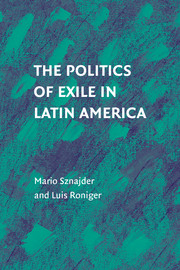Book contents
- Frontmatter
- Contents
- Acknowledgments
- List of Acronyms
- Introduction: The Politics of Exile
- 1 Defining the Exilic Condition
- 2 Forceful Displacement, the Construction of Collective Identities, and State Formation
- 3 The Format of Early Exile
- 4 Sites of Exile
- 5 Widening Exclusion and the Four-Tiered Structure of Exile
- 6 Exile Communities, Activism, and Politics
- 7 Presidents in Exile
- 8 Is Return the End of Exile?
- Bibliography
- Index
- References
3 - The Format of Early Exile
Published online by Cambridge University Press: 28 July 2009
- Frontmatter
- Contents
- Acknowledgments
- List of Acronyms
- Introduction: The Politics of Exile
- 1 Defining the Exilic Condition
- 2 Forceful Displacement, the Construction of Collective Identities, and State Formation
- 3 The Format of Early Exile
- 4 Sites of Exile
- 5 Widening Exclusion and the Four-Tiered Structure of Exile
- 6 Exile Communities, Activism, and Politics
- 7 Presidents in Exile
- 8 Is Return the End of Exile?
- Bibliography
- Index
- References
Summary
[D]uring a time of civil discord no impartial man can be found … and this is because while the actors live it is impossible to get them to agree with the judgment of their fellow men, especially when their own intentions are examined.
Manuel Montúfar y Coronado (1832)Exile became a major feature of political life, inherent in the specific patterns of configuration of modern politics and political regimes in 19th-century Latin America. When the polities reached higher levels of institutional consolidation, exile was already internalized in the political culture as part of an exclusionary politics of exit, prevailing over more open and pluralistic politics of voice, in the terms of Albert Hirschman. In this chapter, we examine the evolution of exile in the newly formed states, focusing on what we define as a three-tiered format of early exile, in which displaced individuals and communities played an increasingly important role in the politics of exit as well as on the formation of state identities and collective imageries.
The Three-Tiered Format of Early Exile
The crystallization of the new states did not preclude overlapping territorial claims. The political class of each region continued to exercise extensive influence on the equation of political forces in the neighboring countries. The intricate connections among Peru, Bolivia, and Chile analyzed in the preceding chapter are not unique.
- Type
- Chapter
- Information
- The Politics of Exile in Latin America , pp. 73 - 90Publisher: Cambridge University PressPrint publication year: 2009



